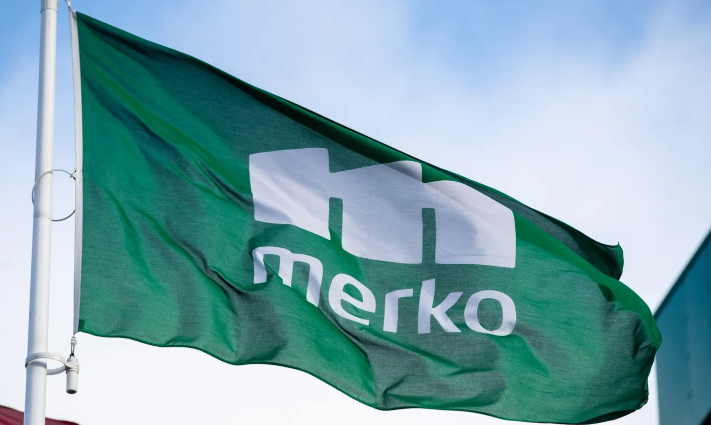Merko Ehitus posted revenue of EUR 160.4 million and net profit of EUR 19.9 million in Q4 of 2024. The respective figures for the entire year 2024 were EUR 539 million and EUR 64.7 million. Approximately 90% of revenue came from sales of construction services and 53% was earned in Lithuania. In coordination with the supervisory board, the management board of Merko Ehitus proposes to the general shareholder meeting to pay out EUR 1.90 per share as dividends.
“Merko’s solid results of 2024 stemmed from the right decisions in terms of focusing on selected sectors and specific projects, and our teams’ excellent work in efficient project implementation together with risk and cost management. In 2024, contracts signed in the turbulent 2021-2022 period, the bulk of the construction on Arter Quarter, the tram line to Old City Harbour, TKM Group logistics centre, the third stage of Vilneles Skverai residential development in Vilnius and the construction of the large-scale Lithuanian wind energy infrastructure were completed. A joint venture in which we have a 50% holding, Connecto, delivered a strong performance in whole year of 2024. The Merko group’s financial position is strong with negative net debt; and the lower need for loans translated into savings on financial costs during a period of higher interest rates,” said CEO of Merko Ehitus group, Ivo Volkov.
“During the last two years, our Lithuanian team started work on several complicated wind farm infrastructure projects. They have been able to make excellent use of economies of scale to build a record 87 wind farm foundations at a steady pace and record speed in what is essentially an industrial production process. In addition, we were able to avoid risks, and all of it together resulted significant cost savings. Costs were also reduced by executing the work on a national defence site in Lithuania ahead of schedule,“ Ivo Volkov added.
“In 2024, we signed close to one-third fewer new contracts than we did in 2023, and the secured order book was significantly lower than the previous year. Construction contracts generally have a term of 18-24 months, and considering the economic climate, low investments and procurements being won with very low prices seen since 2023, a complicated 2025 and 2026 can be expected for the Estonian and Latvian construction sectors. As for developments in Lithuania, there are grounds for much greater optimism there,” said Ivo Volkov. In 2024, Merko group companies signed new construction contracts worth EUR 338 million, which is nearly one-third less than in 2023 (EUR 501 million). As at the end of the year, the group’s balance of secured order-book was EUR 341 million.
“Due to the changed market situation, the results of our real estate development business are significantly more modest than in previous years. The 2024 revenue was only 40% of that of 2023, yet we have managed to retain profitability in this business. Despite the weaker real estate market, the default rate on obligational contracts has not increased and we have succeeded to reduce our backlog of apartments awaiting sale. Economic sentiment is the weakest in Estonia and the strongest in Lithuania, where the market for new apartments is active, and we are increasing our supply. In Latvia, we are hoping to maintain the current market level and in Estonia, supported by the more active real estate aftermarket, we are looking ahead to growth in sales of new real estate,” Ivo Volkov commented on the real estate development sector.
In 2024, Merko delivered 323 apartments and 11 commercial units to buyers. During 2024, Merko launched the construction and sales of 259 new apartments, and as of the end of the year, had 633 apartments on its the balance sheet, of which 17% were covered by preliminary sale contracts. The largest development projects under construction were Uus-Veerenni, Noblessner and Lahekalda in Tallinn; Erminurme in Tartu; Lucavsala, Arena Garden Towers, Viesturdārzs, Mežpilsēta and Magnolijas in Riga and Vilnelės Skverai in Vilnius.
In 2024, the largest projects in progress in Estonia were the TKM Group logistics centre, the Hampton by Hilton and Hyatt hotel buildings, Arter Quarter, the City Plaza 2 office building in Tallinn, the Estonian Defence Forces buildings at Ämari base, a tram line between Old City Harbour and Rail Baltica Ülemiste passenger terminal, the first stage of the Ülemiste multimodal transport junction and the Rail Baltica’s Tõdva highway overpasses. In Lithuania, the largest sites under way were the wind farm infrastructure projects in Kelmė, Pagėgiai and Telšiai regions, a substation in Kelmė and various national defence buildings and infrastructure. In Latvia, a solar energy farm in Vārme municipality and a student hotel in Riga were under construction
